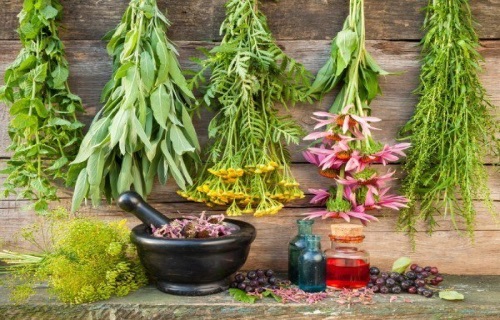Stomach ache is one of the most chronic and debilitating abdominal pains. Medicinal plants are one of the most accessible sources for treating diseases like gastrointestinal disorders. In this review, we investigate and report the most important medicinal plants recommended by Persian medicine for treating stomach aches and comparing them with their proven effects in modern medicine. Gastric pain was probed in Persian medicine reliable textbooks such as Cannon of Medicine .
Stomach ache is one of the most important pains that all people have experienced during their lives at least once. It is one of the most chronic and debilitating abdominal pains . In many cases, the cause of stomach ache is unclear. But, a wide range of factors can cause pain in the abdomen. These causes include He – licobacter pylori, maldigestion, irritable bowel syndrome, gastric reflux, gastric ulcer, etc..
The reason for stomach pain can be anxiety, stress, delay eating in hunger and prolonged starvation . There are other reasons for stomach ache including increased gastric acidi – ty, food poisoning, food allergy, stress-induced nerve pain, stomach infections, menstruation, and even myocardial infarction . Today, the use of medicinal plants is increasing rapidly. By using medicinal plants, complications of using chemical drugs can be prevented. Stom – ach ache is often accompanied by certain symp – toms including fever, vomiting, loss of appetite, inability to eat, and cramps.. Recent documents showed that gastrointestinal prob – lems such as stomach aches or stomach upset can be treated with medicinal plants . Know – ing the attitude of the ancient Persian medicine scholars in treating stomach aches by medici – nal plants can be a good guide for planners and policymakers of the pharmaceutical industry in the world. Therefore, in this review, we in – vestigate the most important medicinal plants affecting stomach ache in Persian medicine and comparing them with their proven effects in modern medicine.
Traditional medicine in the world has been used through the majority of the world population since ancient times. The World Health Organization (WHO) has suggested that more than 80% of people in developing countries, particularly in rural and remote areas are using traditional medicinal, especially
medicinal plants for their primary health care . Considerable economic benefits seem to be the main reason in the use of me dicinal plants and indigenous medicine for treatment and pre vention of diseases. Poverty, communication difficulties and the unavailability of sophisticated modern health facilities are the most important reasons to force people to use traditional medi cines for their diseases. The knowledge for uses medicinal plants
against various diseases seems to be accumulated in areas where the consumption of herbal medicines is still important and con tinued, greatly . An important issue in the use of medic inal plants is that a plant is usually used for several diseases . For example, Azadirachta indica other than stomachache is
also used against skin diseases, smallpox, rheumatism, etc.
Medicinal plants reduce stomach ache by various mechanisms including antibacterial, anti-inflammatory, analgesic, anticholin ergic and antioxidant effects. The points that have been consid ered in Persian medicine about stomach aches seem to have been.
Peppermint
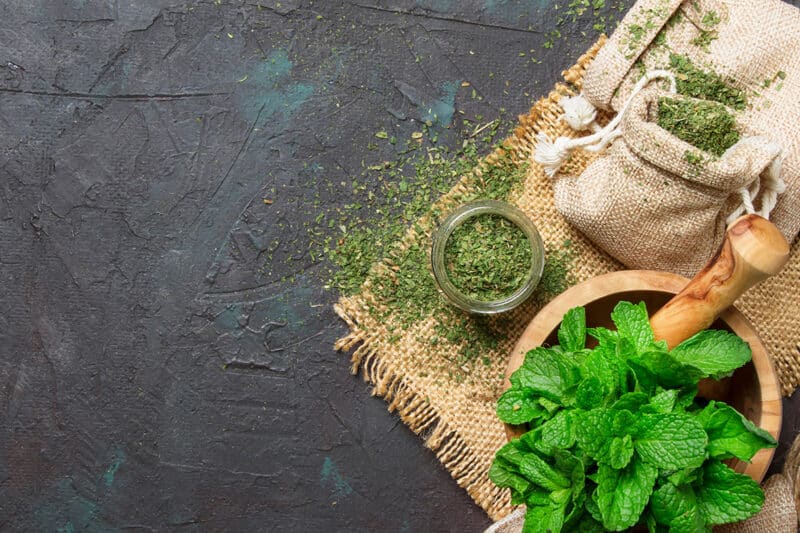
There’s a good reason why peppermint (Mentha x piperita) is a staple in medicinal gardens and herbal apothecary cabinets worldwide. It’s incredibly effective for soothing all kinds of stomach upsets, from nausea and gas to Crohn’s and celiac flare-ups.
Chances are you’ve had at least one cup of peppermint tea in your life so far, probably prepared for you as a child to soothe nausea or the stomach flu.
Peppermint works well for several gastro issues, as its antispasmodic properties can help to relax intestinal clenchings caused by IBS. It also has cooling and analgesic properties so it can lessen all kinds of gastro discomfort.
That said, peppermint can also be a stimulant: although it has cooling energetics, the menthol content can also be warming.
As a result, it can aggravate “hot” conditions such as heartburn and peptic ulcers. In fact, the same antispasmodic characteristics that relax intestinal cramps can also relax the esophageal sphincter.
When that happens, stomach acid can pour back into the esophagus. As you can imagine, it can exacerbate GERD or heartburn significantly.
2. Fennel
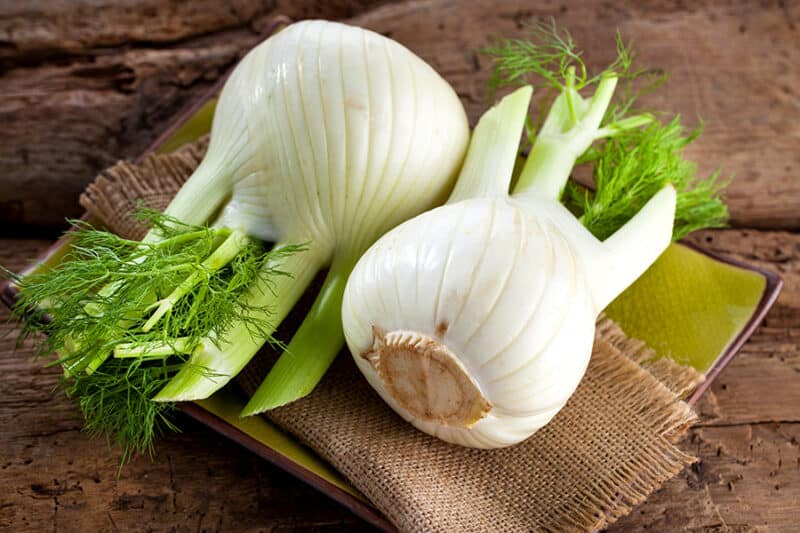
Are you familiar with the term “carminative“? Well, it refers to a substance that can erm… eliminate gas in the digestive system. When it comes to herbs for upset stomachs, it also refers to plants that can help prevent unwanted gas in the first place.
Fennel (Foeniculum vulgare) is surprisingly tasty and has a licorice flavor that’s a bit on the savory side. Its seeds have been added to baked goods for thousands of years, and its juicy bulb can be sliced or grated and eaten raw or cooked.
Chew fennel seeds to alleviate gas pain, nausea, bloating, or make an infusion (tea) with the seeds and/or leaf fronds.
This tea can also be taken to treat colic in babies (via breast milk) and stimulate the appetite in people dealing with shock and grief.
3. Anise Hyssop
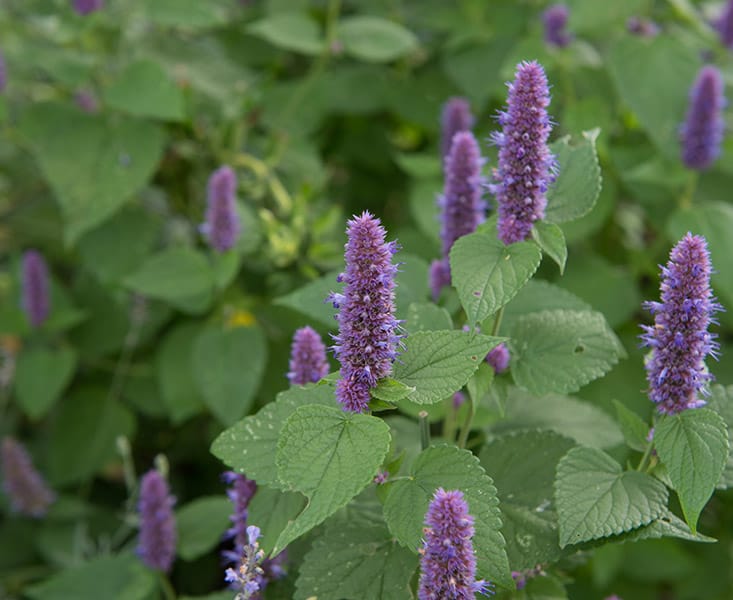
If you like the taste of licorice, as with the fennel above, definitely add anise hyssop (Agastache foeniculum) to your medicinal herbs list. It’s another member of the mint family, so it has similar carminative properties.
That said, in addition to its ability to stop you from being a gaseous mess, it can alleviate the type of anxious tension that can cause indigestion.
Many people use anise hyssop as a flavoring agent for less tasty herbal concoctions. Its natural sweetness and licorice kiss make what would otherwise taste like a swamp significantly more palatable.
4. Raspberry Leaf
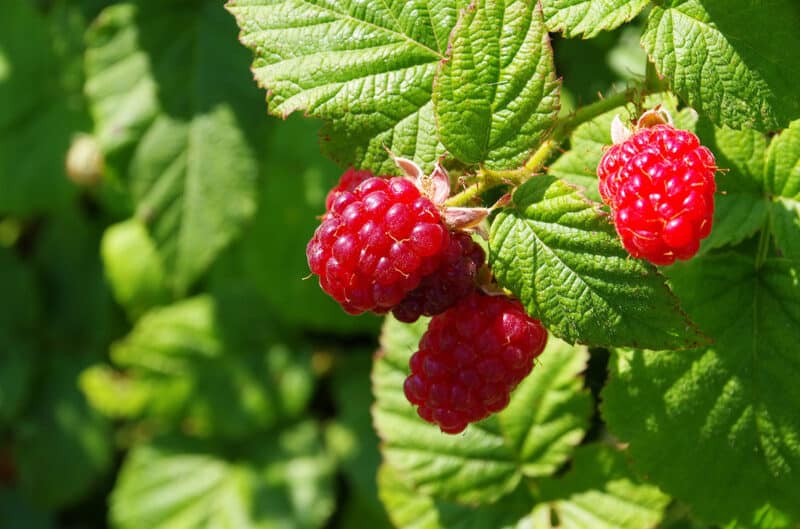
Raspberry leaves (Rubus idaeus) have antispasmodic and astringent properties that are ideal for calming lower belly spasms and diarrhea. When a plant is described as “astringent,” it means that it has drying actions.
If you’re dealing with a nasty bout of food poisoning, or if you have celiac disease and you’ve been glutened, try making a cup of equal parts peppermint and raspberry leaf tea (to create approximately 1 teaspoon per cup of water).
That should help dry things up nicely while calming the abdominal cramps.
5. German Chamomile

This beautiful little herb has several different actions that can benefit a variety of upset stomachs. It’s a member of the daisy family and has a beautiful, sweet, apple-like scent and flavor.
Chamomile (Matricaria recutita) is safe for children, and when mixed with anise hyssop, lemon balm, and catnip, it can create a tea that soothes gas and tummy aches in little ones.
In fact, this tea can be brewed a bit stronger and sipped by nursing mothers to alleviate colic in their babies.
*Note: People who are allergic to ragweed can react badly to chamomile as well. As such, if you have this allergy, try sipping just a tiny bit of weak chamomile tea at first to check your tolerance level.
6. Ginger
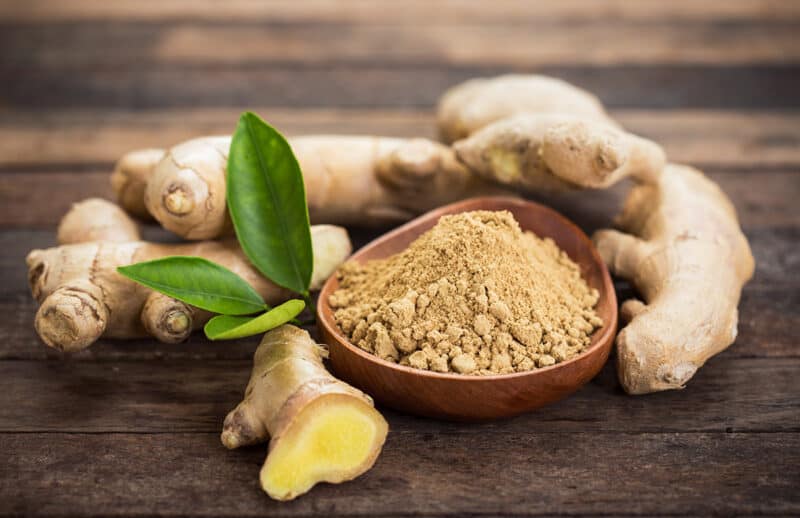
Ginger (Zingiber officinale) is one of the best herbs around for calming all kinds of upset stomachs. It contains gingerols and shogaols that counteract both queasiness and pain.
A mild ginger tea can work wonders for counteracting the morning sickness that women experience during pregnancy. If you find that you get motion sickness during car rides or flights, bring along ginger biscuits as snacks.
Remember that ginger has heating energy, so don’t take it if your gastro issues are hot in nature (heartburn, GERD, peptic ulcer, etc.). Otherwise, you’re adding heat to an already burning condition, and that’ll make things so much worse.
7. Catnip
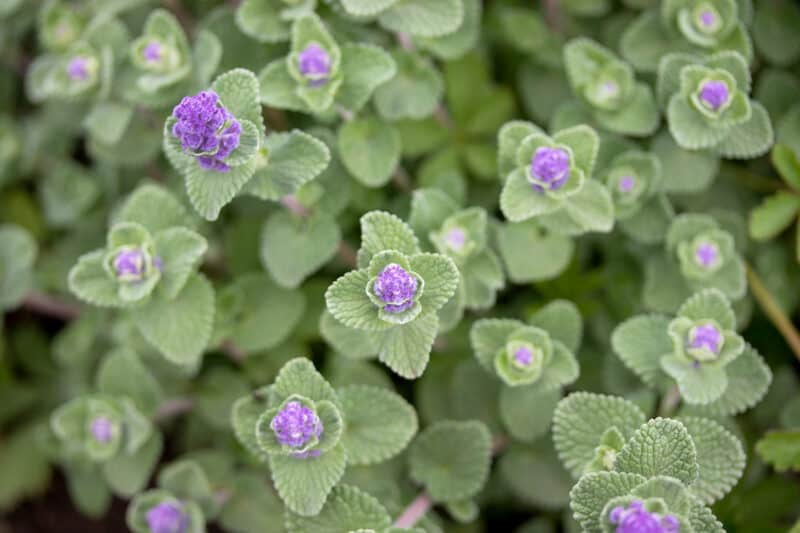
Interestingly, the same herb that drives our feline friends into a frenzy can have such a calming effect on us. Like peppermint and fennel, catnip (Nepeta cataria) is a carminative herb that alleviates gas and bloating.
It’s also anxiolytic and hypnotic, which means that it can calm anxious, frayed nerves and help soothe you to sleep.
Try catnip tea or tincture if your roiling belly issues are caused by stress, anxiety, or grief.
8. Yarrow
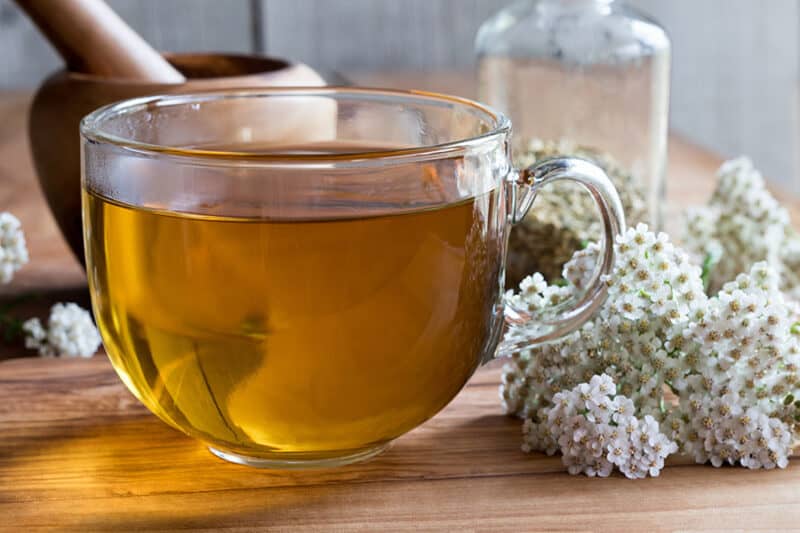
I love yarrow (Achillea millefolium). Honestly, if I had to choose a few favorites from my many plant allies, yarrow would probably be at the top of that list. Not only is it invaluable for staunching wounds, but it also has wondrous astringent properties.
These are spectacular for soothing various stomach upsets and issues, particularly those associated with gallbladder issues.
Additionally, yarrow’s anti-bacterial and anti-microbial properties make it effective for treating bacteria-caused food poisoning. It’s especially effective against E. coli, Salmonella, and the Helicobacter pylori bacteria known for causing stomach ulcers.
9. Licorice Root
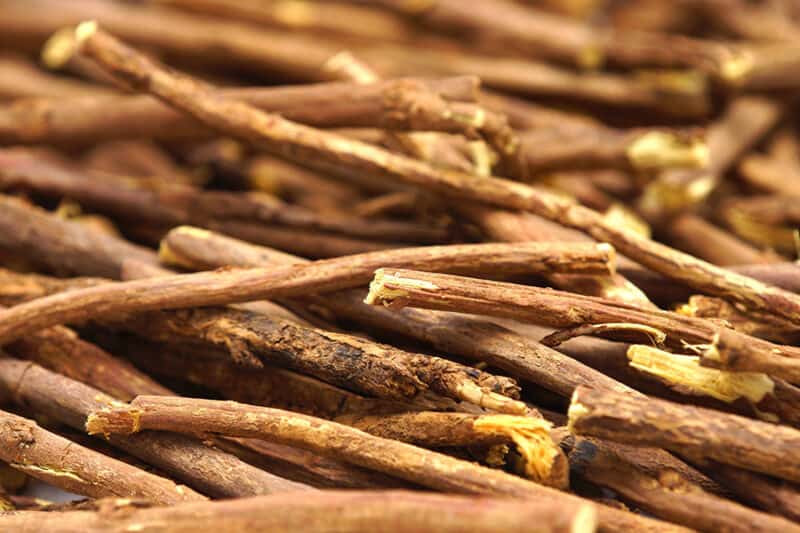
Whereas peppermint can exacerbate hot conditions such as heartburn and GERD, licorice (Glycyrrhiza glabra) is known to alleviate them. It’s demulcent and moistening, just like marshmallow, so it also coats and protects delicate mucous membranes in the throat, stomach, and intestines.
This is why it helps to counteract that awful burn that happens when stomach acid bloops its way up into our throats.
Note that if you have low potassium, hypertension, or edema, you should only take licorice in small doses, as it can exacerbate these conditions. Also, consult with a healthcare practitioner before taking licorice root if you have kidney disease.
10. Lemon Balm
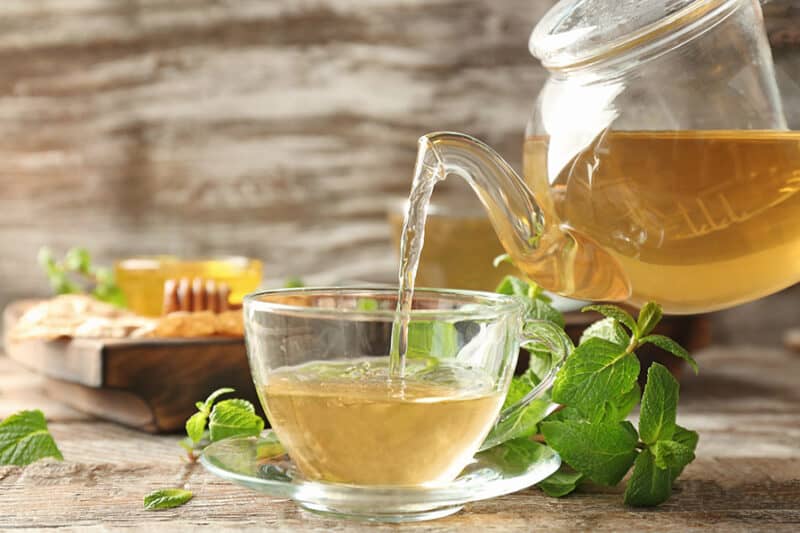
Another member of that magnificent mint family, lemon balm (Melissa Officinalis), is wonderful for all kinds of stomach upsets. Like its cousins, it has anxiolytic, antispasmodic, and carminative properties. As such, it’s good for treating the kind of dyspepsia (indigestion) caused by stress and anxiety.
As you can imagine, it also alleviates IBS flare-ups caused by those emotional upheavals as well.
Its anti-spasmodic properties can reduce menstrual cramps as well as lower abdominal/intestinal cramps caused by estrogen fluctuations. Best of all, its calming effects can also help you get a good night’s sleep while it’s easing your belly woes.
11. Meadowsweet
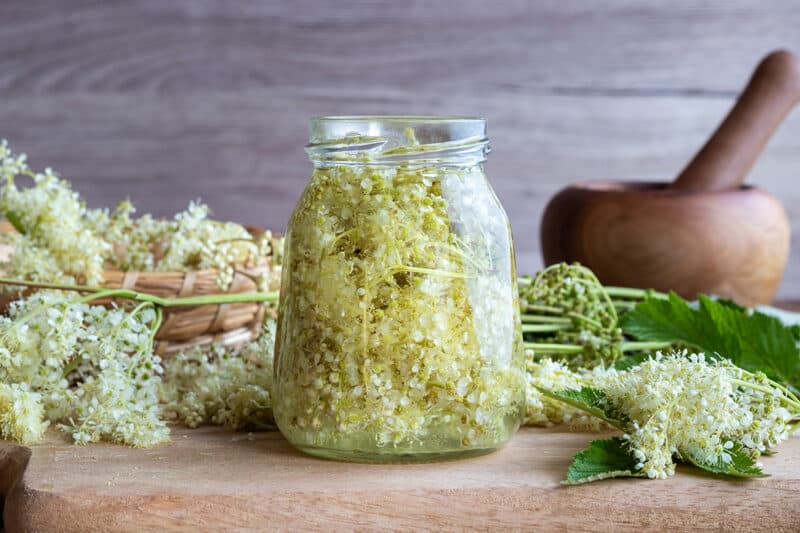
Meadowsweet, with its gentle medicinal actions and sweet flavor, is absolutely perfectly named. It’s often added to astringent preparations to counteract their “ugh” factor but is also effective on its own.
This herb is anti-inflammatory and has analgesic (painkilling properties). As a result, it’s great for soothing the kind of digestive issues caused by inflammation and chronic conditions. It can alleviate IBS and Crohn’s flare-ups, as well as peptic ulcers and heartburn.
12. Marshmallow Root
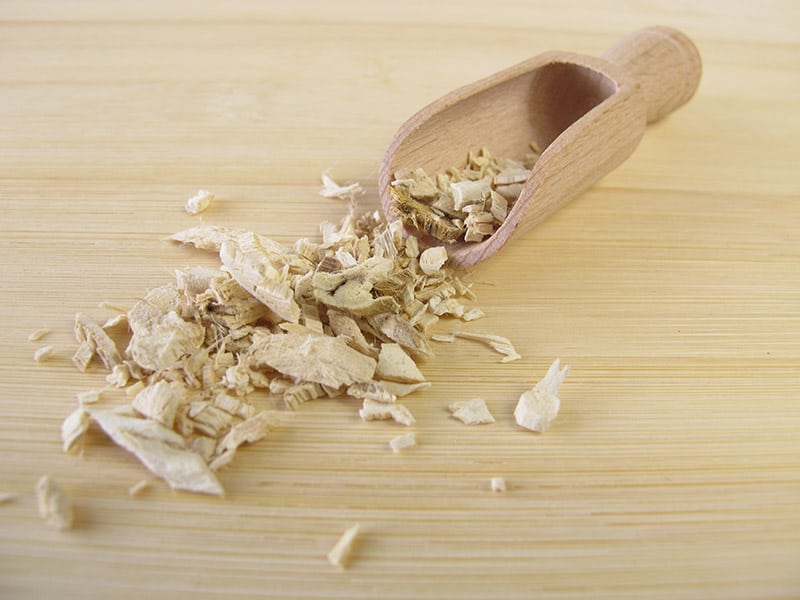
Marshmallow’s demulcent properties help it soothe upset stomachs and gastrointestinal issues with support and healing. Basically, because it’s mucilaginous, it creates a protective, moistening barrier along internal linings. This is why it’s so effective at soothing esophageal, stomach, and intestinal issues.
You can use marshmallow to calm the burn of acid reflux, and ease pain caused by peptic ulcers. It’s also great for irritable bowel syndrome, Crohn’s, celiac disease, and leaky gut syndrome.
Marshmallow’s hydrating components are also good for alleviating constipation.
Generally, if what you’re dealing with is inflammatory in nature, demulcent herbs like marshmallow and slippery elm (Ulmus rubra) can help to provide soothing relief.
Determine The Cause of Stomach Upsets: Don’t Just Treat Symptoms
As mentioned at the top of this article, it’s important to determine what’s causing stomach upsets, rather than just throwing remedies at them.
Remember that many conditions can have similar symptoms, so if you’re dealing with an issue for more than a few days, or if pain and discomfort are severe, consult with your healthcare provider.
Additionally, as with all medications—standard or herbal—it’s vital to do your research before taking anything. This way, you can determine potential negative reactions, contraindications with any prescriptions, or allergies.
Any of these herbs can help with upset stomachs, but only if you know what is causing your tummy issues.
Do you know about the gift of nature to save the life of people from various health problems and make them feel secure by curing significant issues? How to live healthy in this world without having chronic diseases or illness or any other health issues which may hurt you physically and mentally? Due to dense population, people are trying to demolish the forest, garden areas to create shelter, so they forced to destroy the nature’s gift such as natural ingredients, secret medicinal herbs and more which are grown in wild forest, mountains and other places. When you read this review entirely, sure you will get chance to know about secrets medicinal ingredients, herbs and more used by our ancestor to get back the lost health without losing your life. Claude Davis was highlighted all the stuff in the form of the e-book The Lost Book Of Remedies filled with a list of natural ingredients and remedies that you can quickly grow in the backyard or at free space to include it in your routine diet or external usage to get well soon.
Books can be your best pre-collapse investment.
Carnivore’s Bible (is a wellknown meat processor providing custom meat processing services locally andacross the state of Montana and more. Whether your needs are for domestic meator wild game meat processing)
The Lost Book of Remedies PDF ( contains a series of medicinal andherbal recipes to make home made remedies from medicinal plants and herbs.Chromic diseases and maladies can be overcome by taking the remediesoutlined in this book. The writer claims that his grandfather was taughtherbalism and healing whilst in active service during world war twoand that he has treated many soldiers with his home made cures. )
Easy Cellar(Info about building and managing your root cellar, plus printable plans. The book on building and using root cellars – The Complete Root Cellar Book.)
The Lost Ways (Learn the long forgotten secrets that helped our forefathers survive famines,wars,economic crisis and anything else life threw at them)
LOST WAYS 2 ( Wordof the day: Prepare! And do it the old fashion way, like our fore-fathers did it and succeed longbefore us,because what lies ahead of us will require all the help we can get. Watch this video and learn the 3 skills that ensured our ancestors survival in hard times offamine and war.)

